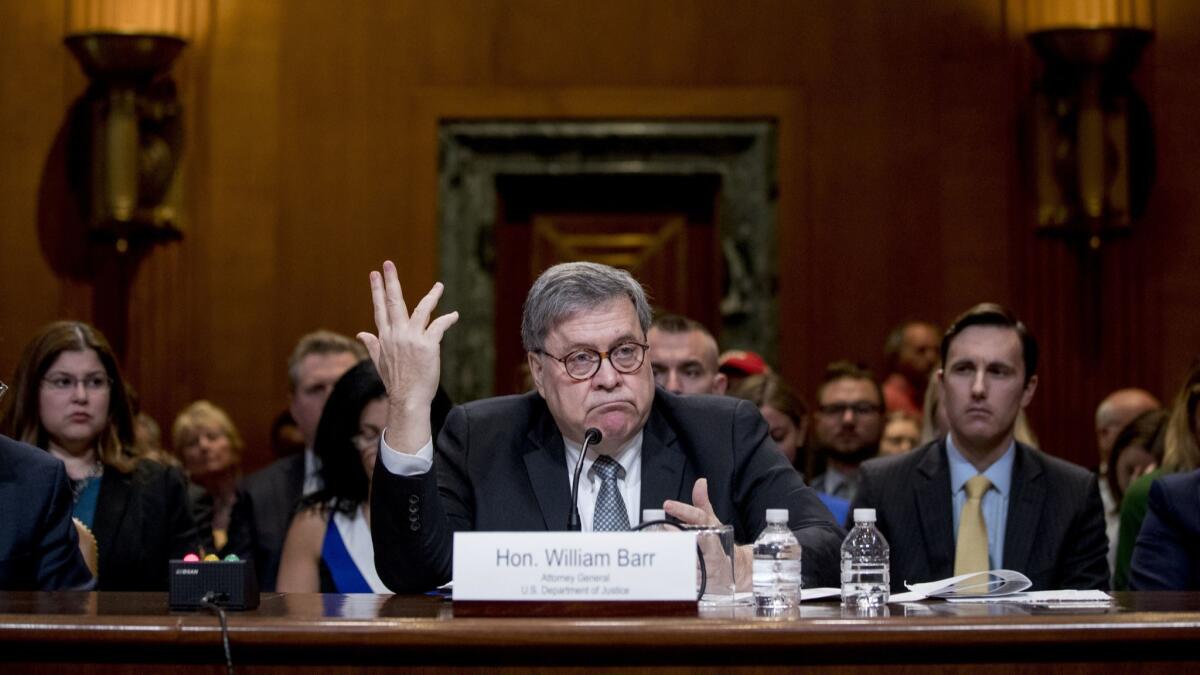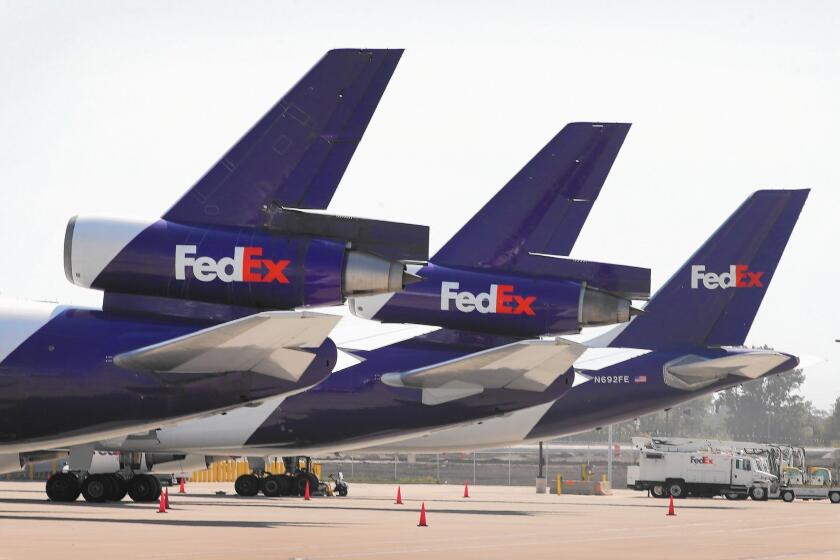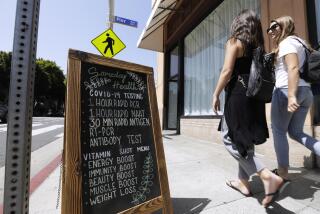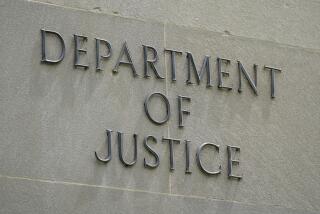Need for supplies to fight coronavirus opens door to unusual brokers — and scammers
The three businessmen owned a commercial moving company and a print shop, and sold ATMs. They didn’t know the difference between a respirator and ventilator, but that didn’t stop them last month from leaping into the frenzied marketplace for medical equipment to battle the coronavirus.
In a matter of days, the trio orchestrated a successful $3.5-million deal for 1.5 million N95 respirator masks for healthcare providers in Illinois. The unlikely brokers, who teamed up with three people in China and dubbed themselves the “Magnificent Six,” represent a new breed of middlemen linking desperate states and hospitals to suppliers.
Filling a vacuum created by the Trump administration’s refusal to take control of the medical supply chain amid the pandemic, such brokers are battling each other in a Wild West-like bazaar for sales of critical equipment. It’s a market ripe for fraud and abuse —federal authorities have warned hospitals and local governments to be wary of scam artists — and experts say confusion and price-gouging are common. In the chaos, hospitals and states have been forced to vet their vendors, to weed out schemers and unreliable agents, slowing the acquisition of crucial gear.
“You have a lot of players that are essentially getting into the game just to make a buck without really understanding what these products are,” said Dan Pak, who oversees procurement for seven Connecticut hospitals and has spent recent weeks vetting brokers. “A lot of them are offering you access to millions of masks and gowns when they have absolutely no idea where they’re going to come from.”
Pak, a vice president for Hartford HealthCare, said he has received at least two FBI advisories flagging brokers using fake certificates and targeting hospitals. Multiple brokers have recycled the same doctored certificate and tried to pass it off as unique, he said.
Local and federal authorities say many frauds have emerged amid the coronavirus pandemic, feeding off the fear and confusion bred by the virus and its lack of a cure or vaccine.
“You do have brokers out there really taking advantage of the situation,” Pak said.
Legitimate brokers say they are filling a void, and not seeking to rip off anyone. Though many had no experience in medical equipment before the coronavirus outbreak, they said they nonetheless had something valuable: contacts with suppliers and other distributors.
SupplyCore Inc., a company based in Rockford, Ill., that specializes in providing logistical support to the U.S. military, entered the fray after local officials asked it for help in obtaining goggles, gloves, masks, face shields and disinfectant. Leveraging relationships with U.S. and foreign suppliers, the company quickly lined up the deal, said owner Peter Provenzano.
“We told Rockford we would give it our best shot,” he said, adding, “There was just so much need, and we wanted to help, and we had the relationships to make it happen.”

More than half of SupplyCore’s 250 employees are working, at least in part, on brokering deals for personal protective equipment, and the firm has booked about $10 million in orders from Illinois, other states and hospitals. Its gross margins are in line with its military work — about 8% to 15% per contract, Provenzano said.
Illinois officials said it was helpful to work with local contractors like SupplyCore because they were easier to vet and track. Other states have taken a similar approach. Virginia contracted with a medical logistics company in the state to obtain $27 million in protective equipment, said Brian Moran, the state’s secretary of public safety and homeland security.
Finding the right broker wasn’t easy, Moran said. The state carefully culled a list of 600 vendors to identify 180 that officials believed could deliver what was needed. “There were lots of well-intentioned people providing us information and demanding millions of dollars,” Moran said. “It was like nothing I have ever seen.” Some, he added, were likely scammers.
Officials are aggressively pursuing scammers, threatening legal action if they continue to promote bogus coronavirus preventions and cures.
Federal authorities have said they are tracking criminal organizations that have become engaged in financial frauds tied to the coronavirus response.
A 39-year-old Atlanta man, already facing federal charges on allegations of running a $115-million Ponzi scheme, was arrested last week by federal agents on charges he tried to cheat the Department of Veterans Affairs out of $750 million for respirator masks he could not obtain.
“Even beyond the typical costs associated with unlawful behavior, Covid-19 scams divert government time and resources and risk preventing front-line responders and consumers from obtaining the equipment they need to combat this pandemic,” Atty. Gen. William Barr said in a statement announcing the arrest.
“You have a lot of players that are essentially getting into the game just to make a buck without really understanding what these products are.”
— Dan Pak
Brokers can be victims, too.
Chaun Powell, vice president of strategic supplier engagement at Premier, a healthcare company that handles group purchasing for more than 4,000 hospitals, said reputable brokers have fallen prey to scams in which the supplies they supposedly acquired were already spoken for, or didn’t exist.
Powell said a trusted supplier introduced him to a man who claimed he could sell Premier 20,000 ventilators a month made by the medical device company Medtronic. What Powell knew, and the would-be supplier didn’t, is that Medtronic hadn’t been able to fill much smaller orders.
“Frankly, there’s a lot of good people getting caught in the middle of this and [they] don’t even realize it,” Powell said. “We believe there are several hundred different agents all representing similar inventories — if those inventories even exist at all.”
The so-called Magnificent Six didn’t have any trouble finding 1.5 million N95 masks, one of the most sought-after pieces of protective gear. The quest started on March 13 when Jeffrey Polen, owner of the Moving Concierge in Lemont, Ill., received an email from Illinois officials asking for help in obtaining gloves, gowns, masks and ventilators.
With the commercial moving industry at a standstill, Polen said he had nothing else to do, so he called a friend who owned a print shop and another who sold ATMs out of Germany. Both had business contacts overseas. In just a few days, the businessmen enlisted three sales representatives in China.
The sales team found a factory in China that had 1.5 million N95 masks on a warehouse floor, but it warned the Americans that the goods would soon be snapped up by competitors. Within days, just 500,000 were left, Polen said.
Polen convinced Illinois officials to quickly cut a check, which he deposited just 20 minutes before the bank closed, making the deadline to obtain the masks. The 500,000 masks began shipping within a few days, Polen and Illinois officials said, and a million more were subsequently manufactured and sent to Chicago.
After expenses, Polen said his group may net just over $300,000 on the deal. He and his associates have also secured gloves, masks, shields and gowns for other cities and a university hospital.
In the rush for coronavirus supplies, major medical companies get a special deal from the Trump administration
The other day, a representative for several medical centers approached him for gloves, insisting on paying no more than $8 a box.
“I told him, in all honesty, that what you paid before the pandemic you are not going to pay now,” Polen said. “And we looked around and found a supplier willing to sell gloves for $7 a box. I called the guy and told him the news, and he didn’t believe me. He was getting ripped off before.”
More to Read
Get the L.A. Times Politics newsletter
Deeply reported insights into legislation, politics and policy from Sacramento, Washington and beyond. In your inbox three times per week.
You may occasionally receive promotional content from the Los Angeles Times.










